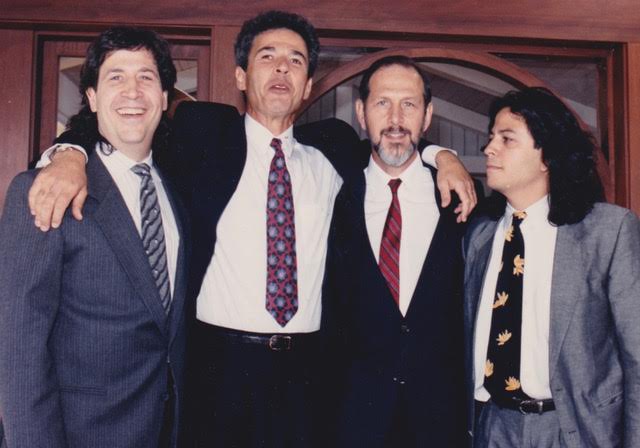At the recent memorial for my brother-in-law Lawrence Lesser, my husband, Bobby, and his brothers spoke about Larry’s fundamental goodness. All true. But Larry was more than a loving brother, father, and husband — with a swell singing voice.
In fact, Larry was a Big Wow! Dare one say it, an American patriot.
How many graduate at the top of their class at Bronx Science High, win a Regents Scholarship, ace it into Cornell University (studying literature with Vladimir Nabokov), and become editor of The Cornell Writer, where he was the first to publish Thomas Pynchon?
Then go on to serve in the Peace Corps in Nigeria and leapfrog into the Foreign Service and a decades-long career at the U.S. State Department!

Larry would represent the U.S. in India, Beirut, Iraq, and Afghanistan, Burkina Faso in Western Africa, and Rwanda, to name just a few hot spots — before, during, or after their worst years of upheaval and war. To make sure he could speak with everyone, he learned French and Hindi.
Did I mention that during the first months of his very first posting, the delicate Cold War détente between the U.S. and the Soviet Union could well have slipped from its moorings?
On March 5, 1967, Svetlana Stalin — that would be Stalin’s only daughter — came into the magisterial U.S. embassy wanting to defect. A “walk-in,” as Larry titled a story he wrote about the event years later. At the time, Lawrence B. Lesser was working in the embassy as an American Vice Consul officer, but decidedly not high in the pecking order.
A Marine corporal security officer — noting the Soviet passport — promptly summoned the designated CIA officer and embassy official. “[She] told him she was Joseph Stalin’s daughter,” Larry wrote. “Let that sink in: Stalin’s daughter. Stalin was the totalitarian leader of the U.S.S.R. for many years until his death in 1953. [He] might have thought, ‘Yeah lady.’”
As it turned out, she was the real deal. Red alert would not be an overstatement. The CIA Station Chief and U.S. ambassador, Chester Bowles, were called immediately. Bowles telegrammed Secretary of State Dean Rusk, who likely notified President Lyndon Baines Johnson.
Getting Stalin’s daughter out of India — most especially, the U.S. Embassy — without igniting the Soviets’ ire meant a certain urgency. Despite a madcap obstacle course, she was spirited out of Delhi with a CIA escort — first to Rome, on to Switzerland, and then the U.S. For months, she lived at the Princeton home of George Kennan, formerly the State Department’s top Russia hand and diplomat.
Despite a series of top-drawer postings and A-list encounters, Larry was not a showboater nor much of a politician — though he was surrounded by both. But he had the gifts, bearings, and wits to be asked by the State and Defense Departments to report on post-invasion Iraq’s Rule of Law. Later, he was asked to write the post-invasion report on Afghanistan’s failing security systems, another perilous assignment.
Aware that Larry knew the scale of failure of both invasions, I introduced him to one of the New York Times’ sharpest Mideast reporters. “Your brother-in-law, this guy,” he said, “he really knows stuff.”
Larry authored numerous Human Rights and Rule of Law reports that required covering the sorry messes in Belarus, Moldavia, etc. as well as being an Election Supervisor in the former Soviet Republics and the Balkans. He had the distinction of being the only one willing to report firsthand on Siberia’s elections.
At home, Larry used his spare time to work as a mediator in the Washington and Virginia courts; others would have opted to play backgammon. His belief in diplomacy was bone deep.
Each posting of Larry’s near 60-year foreign service career was a big deal for ordinary mortals — for his willingness to take on thankless, challenging, often dangerous assignments.
His modesty and grace betrayed the depth of his accomplishment and lifelong service to make the world a better place. He was a true believer in American democracy — here and as role model for the rest of the world.
I last saw Larry around a year ago at his modest apartment in Washington, D.C. He was sitting in his living room, his wife, Susan, cooking in the kitchen. Larry was holding the hand of Bobby, his beloved brother. Speech was becoming difficult for him. But as his brilliant brain contracted, his heart was bursting in full flower.
I pulled a chair up close to him; his eyes widened and met mine; then, he said very slowly, “I seemed to have lost my way.”
It took a few moments to contain the rush of feeling and tears we felt in the ensuing pause. Bob and I each took one of Larry’s hands. “Oh no, Larry, you found your way,” I gushed. “You found the road home.”


You must be logged in to post a comment.